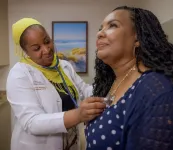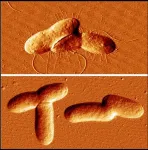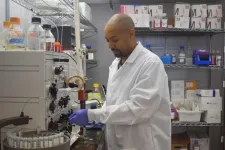(Press-News.org) In an effort to close the gap in neurological outcomes for underserved populations, a UTHealth Houston project funded with $2.9 million from the National Institutes of Health (NIH) will engage community partners to improve the design of clinical trials.
Neurologic conditions including stroke, Parkinson’s disease, and vascular cognitive impairment and dementia contribute to the leading causes of death and disability in the U.S. The goal of the project is to build an infrastructure for community-engaged research interventions for those three neurologic conditions affecting brain health.
“Historically, clinical trials for neurological conditions haven’t consistently or holistically included the voice of underserved communities that shoulder the largest burden of disease,” said Anjail Z. Sharrief, MD, MPH, principal investigator for the trial and professor with the Department of Neurology in McGovern Medical School at UTHealth Houston. “If community input is part of the research plan from the beginning, the clinical trial will more likely include a broader patient population, and research findings and outcomes will be more applicable to the wider range of patients affected by the conditions.”
For example, Sharrief said, designing clinical trials that require patients to come into the clinic during the work week instead of Saturdays limits the ability of lower-wage earners who would lose income by participating. Follow-up televisits instead of in-person visits also make a clinical trial easier for people to join. Including funding for transportation and bilingual research staff would also make it more possible for people from underserved communities to participate.
“We often develop trials for what we, the researchers, are able to do, not what the community is able to do,” Sharrief said.
The project will establish a Brain Health Equity Collaborative to facilitate the academic and community partnerships for clinical trial development. The collaborative will include a community advisory board to review consent forms, assessment questions, and other components of a research trial to ensure they are relatable to a wide range of patients. A community oversight committee will ensure that patient and caregiver voices are being heard and that trials are adhering to protocols for community engagement.
“When you cannot recruit patients from certain communities to participate in a clinical trial, it’s not merely an issue of trust or interest — you’ve made it too hard for them to participate,” Sharrief said. “This is super exciting because it marries our passion for research with our commitment to community engagement and empowerment.”
Community partners include ProSalud, Gulfton Home Community, African American Male Wellness Agency, and the Christopher Pichon II Foundation.
Co-investigators for the trial from the Department of Neurology at McGovern Medical School are Elizabeth Noser, MD, associate professor and James C. Grotta, MD Chair in Neurological Recovery and Stroke; Chigozirim Izeogu, MD, MPH, assistant professor; Mya Schiess, MD, professor, director of Movement Disorders and Neurodegenerative Diseases, and Adriana Blood Distinguished Chair in Neurology; Shivika Chandra, MD, associate professor and chief of neurology at Harris Health Lyndon B. Johnson Hospital; and Kendra Anderson, PhD, assistant professor.
Other co-investigators are Jose-Miguel Yamal, PhD, associate professor of biostatistics at UTHealth Houston School of Public Health; Amy Franklin, PhD, associate professor and associate dean for Student, Faculty, and Community Affairs at McWilliams School of Biomedical Informatics at UTHealth Houston; and Logan Thornton, DrPH, MPH, director of Population Health and Evidence-Based Practice Healthcare Transformation Initiatives at UT Physicians.
Yamal is a member of The University of Texas MD Anderson Cancer Center UTHealth Houston Graduate School of Biomedical Sciences. Sharrief, Yamal, Noser, and Anderson are members of the UTHealth Houston Institute for Stroke and Cerebrovascular Diseases.
Funding came from the National Institute of Neurological Disorders and Stroke (1R01NS40001-01), part of the NIH.
END
Project to redesign clinical trials for neurologic conditions for underserved populations funded with $2.9M grant to UTHealth Houston
2025-01-10
ELSE PRESS RELEASES FROM THIS DATE:
Depression – discovering faster which treatment will work best for which individual
2025-01-10
Depression can affect anyone. It is common, and in many cases severe. These days, there are good treatments available, typically involving a combination of psychotherapy and medication. However, finding the right treatment can take some time. Not everyone responds equally well to every medication. Researchers at six European university medical centers, led by Charité – Universitätsmedizin Berlin, teamed up to accelerate the process of arriving at solid findings relating to both new and known treatments. The key will be a joint study design, supported over the ...
Breakthrough study reveals unexpected cause of winter ozone pollution
2025-01-10
Researchers from the Hong Kong Polytechnic University, alongside mainland collaborators, have uncovered an unexpected phenomenon: severe wintertime ozone (O₃) pollution in Lanzhou, China, driven primarily by alkene emissions from local petrochemical industries. Traditionally associated with warm weather and strong solar radiation, hourly O₃ levels exceeding 100 ppbv were recorded during cold January days in 2018, peaking at an alarming 121 ppbv.
Using an advanced photochemical box model, the study identified alkene ozonolysis as ...
nTIDE January 2025 Jobs Report: Encouraging signs in disability employment: A slow but positive trajectory
2025-01-10
East Hanover, NJ – January 10, 2025 – The employment-to-population ratio for people with disabilities has remained stable over the past 15 months amid historically high levels, with recent data suggesting a modest but encouraging upward trend, according to today’s January 2025 National Trends in Disability Employment monthly update (nTIDE) issued by Kessler Foundation and the University of New Hampshire’s Institute on Disability (UNH-IOD).
Month-to-Month nTIDE Numbers (comparing November 2024 to December 2024)
Based on data from the U.S. Bureau of Labor Statistics (BLS) ...
Generative AI: Uncovering its environmental and social costs
2025-01-10
A recent commentary article by researchers from Northwestern University, Harvard University, and The University of Texas at San Antonio highlights the significant but overlooked environmental and social impacts of Generative Artificial Intelligence (GenAI). Published in Environmental Science and Ecotechnology, the research underscores the urgent need for sustainable practices and ethical governance as GenAI technologies proliferate.
The study reveals the environmental toll of GenAI development, with hardware production such as GPUs and data centers consuming ...
Lower access to air conditioning may increase need for emergency care for wildfire smoke exposure
2025-01-10
FOR IMMEDIATE RELEASE
January 10, 2025
Contact:
Jillian McKoy, jpmckoy@bu.edu
Michael Saunders, msaunder@bu.edu
##
Lower Access to Air Conditioning May Increase Need for Emergency Care for Wildfire Smoke Exposure
As Los Angeles County battles the most destructive wildfires in its history, a new study suggest that US policies should prioritize equity and education regarding the measures people can take to protect themselves from the harmful pollutants in wildfire smoke.
People who have limited access to air ...
Dangerous bacterial biofilms have a natural enemy
2025-01-10
If your teeth have ever felt fuzzy after skipping a brushing, you’ve encountered biofilm—a slimy bacterial layer that clings to surfaces. In medical settings, biofilms make infections harder to treat when they form protective shields for bacteria on devices like catheters and implants.
UC Riverside scientists have now discovered a chemical that plants produce when they're stressed prevents biofilm from forming. The breakthrough offers potential advances in healthcare as well as preventing equipment corrosion in industrial settings.
“In simple terms, biofilms are communities ...
Food study launched examining bone health of women 60 years and older
2025-01-10
Hinda and Arthur Marcus Institute for Aging Research investigators at Hebrew SeniorLife have launched a large clinical food trial to test whether a combination of probiotics and prebiotics (BondiaÒ or SBD111) developed by Solarea Bio will help manage bone health in women aged 60 years and above. The first participants have joined the study and the Institute seeks additional women for the 18-month effort.
“I am very happy to be involved in this important research to help with bone health in women,” says study participant Kathy ...
CDC awards $1.25M to engineers retooling mine production and safety
2025-01-10
From mapping ore to predicting slope behavior and reclaiming land, mining is a rapidly evolving technological industry. Yet planning and operations have not necessarily kept up with the advancements.
With $1.25 million from the National Institute for Occupational Safety and Health, or NIOSH, mining and geological engineering researchers in the University of Arizona College of Engineering are boosting their efforts to better align technology and planning for improved safety and productivity.
The award from the institute, part of the Centers for Disease Control and Prevention, will fund the research ...
Using AI to uncover hospital patients’ long COVID care needs
2025-01-10
PHILADELPHIA— Across the United States, no hospital is the same. Equipment, staffing, technical capabilities, and patient populations can all differ. So, while the profiles developed for people with common conditions may seem universal, the reality is that there are nuances that require individual attention, both in the make-up of the patients being seen and the situations of the hospitals providing their care.
New research shows that artificial intelligence can potentially help improve care overall by combing through ...
$1.9M NIH grant will allow researchers to explore how copper kills bacteria
2025-01-10
TUCSON, Arizona — A researcher at the University of Arizona College of Medicine – Tucson received a $1.9 million grant from the National Institutes of Health to continue his research into uncovering the mysteries of copper – specifically, how it can be harnessed to kill harmful bacteria and other microorganisms.
“We started using copper tens of thousands of years ago to cut down on bacterial infections,” said Michael D.L. Johnson, PhD, an associate professor ...




